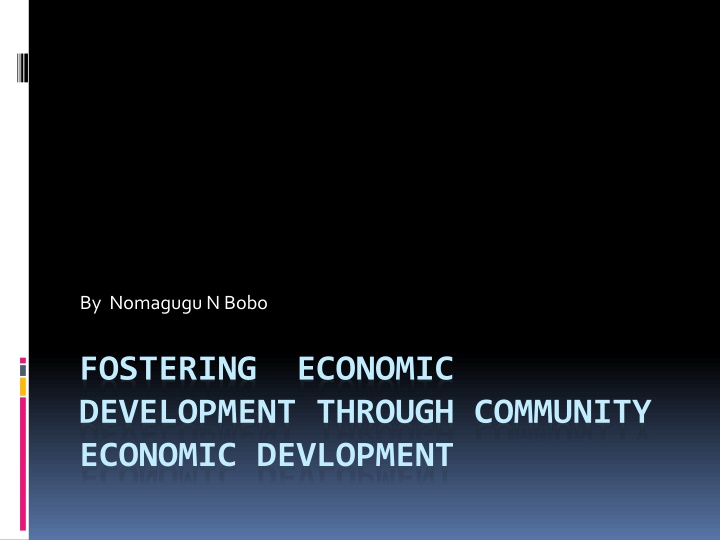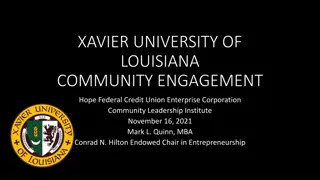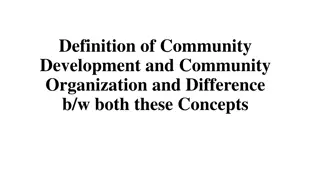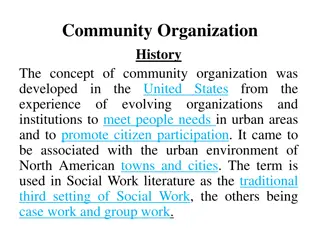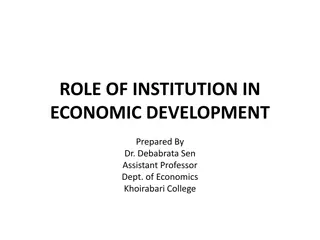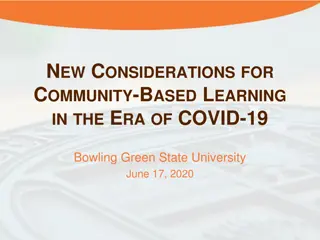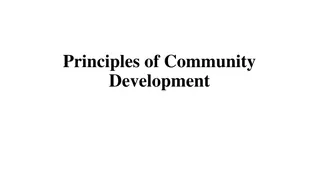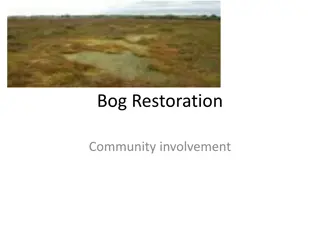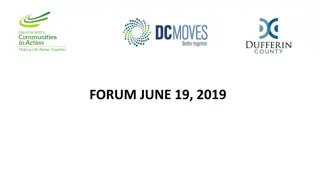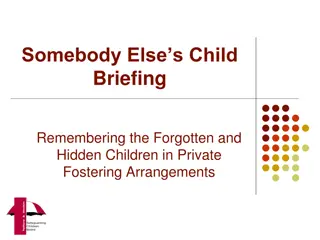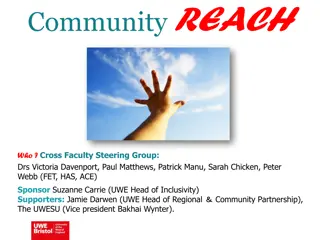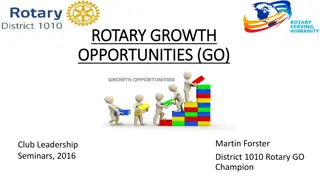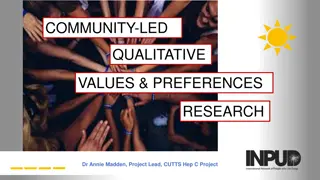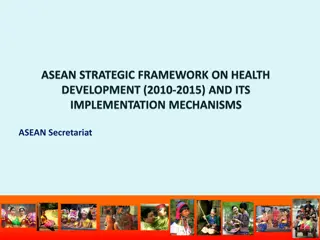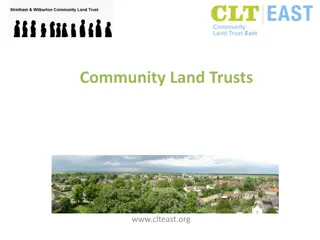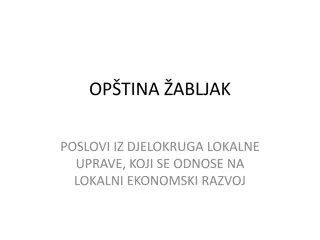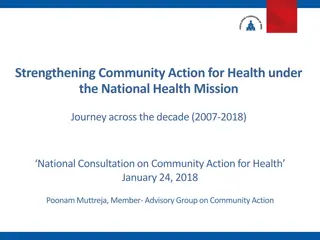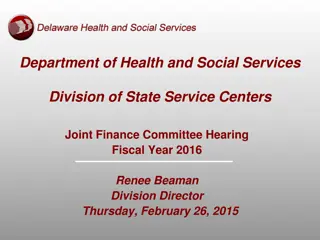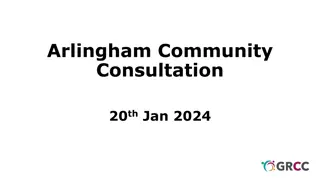Fostering Economic Development Through Community Economic Development
Community Economic Development (CED) involves local actions to create economic opportunities improving social conditions, especially for the disadvantaged. It recognizes the interdependence of economic, environmental, and social challenges, emphasizing solutions rooted in local knowledge. The ultimate goal is to achieve social equilibrium for a good quality of life. The concept of development, often ambiguous, encompasses modernization, industrialization, and economic progress. Despite varying interpretations, development remains crucial for improving the overall well-being of communities. This is highlighted in the case of Gwanda Town, Zimbabwe, a small underdeveloped town with a significant population living below the poverty line.
Download Presentation

Please find below an Image/Link to download the presentation.
The content on the website is provided AS IS for your information and personal use only. It may not be sold, licensed, or shared on other websites without obtaining consent from the author.If you encounter any issues during the download, it is possible that the publisher has removed the file from their server.
You are allowed to download the files provided on this website for personal or commercial use, subject to the condition that they are used lawfully. All files are the property of their respective owners.
The content on the website is provided AS IS for your information and personal use only. It may not be sold, licensed, or shared on other websites without obtaining consent from the author.
E N D
Presentation Transcript
By Nomagugu N Bobo FOSTERING ECONOMIC DEVELOPMENT THROUGH COMMUNITY ECONOMIC DEVLOPMENT
Definition of Community Economic Development The Canadian (CED) network 2016, defines community economic development (CED) as action by people locally to create economic opportunities that improve social conditions, particularly for those who are most disadvantaged .
Definition of Community Economic Development .CED is an approach that recognises that economic, environmental and social challenges are independent, complex and ever changing. To be effective solutions must be rooted in local knowledge and led by community members.
The Concept of Development The main reason behind any community development programme is to foster development In economic terms development could be viewed as a point of social equilibrium", where all aspects of a good social life are attained.
The Concept of Development Thomas 1999 : 46 quoted in Development studies by Jefferey Haynes (2008), states that while modernisation, industrialisation and development often appear effectively to be synonyms , the concept of development actually embodies considerable ambiguity.
The Concept of Development UNDP reports over the years indicate that a great majority of developing countries measured in overall terms have seen substantial ,more often patchy economic and human development over time. The overall implication is that development is a vague and yet predictive term, which struggles to acquire a precise meaning (Clark 2006), quoted in Jeffrey Haynes.
The Case of Development in Gwanda Town-Zimbabwe
The case of Development in Gwanda town -Zimbabwe Gwanda is a small town ,126km South of Bulawayo the second largest city in Zimbabwe. Gwanda has a population of approximately 20 000 people. It is under-developed and has most of its population living under the poverty datum line.
The case of Development in Gwanda town-Zimbabwe
The Case of Development in Gwanda Town There have been so many community development programmes in Gwanda town since time immemorial. Most of them aim to develop the social livelihoods of the people. The Government Ministries and local authorities work hand in hand with NGOs to foster this mandate.
The Case of Development in Gwanda Town-Zimbabwe Most of the community based programmes try to improve on things such as health, education as well as the infrastructure to go with the needs. To mention but a few the NGOs usually look into issues to do with nutrition,hygiene,water and sanitation as well as Hiv and Aids.
STATEMENT OF THE PROBLEM There are no signs of vivid development in Gwanda town. As stated by Thomas 1999 : 46 quoted in Development studies by Jefferey Haynes (2008), states that modernisation, industrialisation and development) are synonyms..... .
STATEMENT OF THE PROBLEM While urban toilet coverage is near to 100%, appropriate construction and safe disposal is increasingly difficult to ignore. Leaking tanks and infrequent emptying in urban settings is equivalent or worse to the dangers of open defecation in rural settings. Without proper faecal sludge management, improved sanitation and hygiene in peri-urban and small towns is an illusion. Sustainable Sanitation & Hygiene for All in the 14 small towns (Gwanda included) programme aims to contribute to a change in the way in which human waste is managed in cities and towns. (NCUWASH 2016,Article on water and sanitation programmes ).
ASSUMPTIONS This paper assumes that development is visible through modernisation and lifestyle changes of the people. Secondly that development is a slow process that should however, show signs.
Purpose of the Study To investigate the causes of community economic development failures in Gwanda town.
METHOD AND DESIGN This research is an evaluation research, William K Trochim (2006),Research Methods (second edition ) states that the generic goal of most evaluations is to provide useful feedback to a variety of audiences including sponsors, donors, client groups, administrators.
Method and Design He further stipulates that evaluations provide ground for decision makers. and recipients with information that will assist in providing corrective measures to the current programme systems. The results of this research will assist in the development and improvement of community development programmes in Gwanda town.
RESEARCH STRATEGY A scientific approach has been used in this paper. Trochim (2006), asserts that scientific models prioritise on the desirability of impartiality, accuracy, objectivity and validity of the generated information.
QUALITATIVE RESEARCH The most important focus in collecting data was to listen to the voice of the participants To obtain comprehensive detailed data encouraging the participants to be as open and articulate as possible.
QUALITATIVE RESEARCH According to Newby (2010),qualitative research deals with processes that drive behaviour and the experience of life. The qualitative approach permitted the understanding of attitudes, perceptions and feelings in depth in order to provide thick descriptions which give an insight into real life for the students concerned. (Geertz 1973, Denscombe 2007)
RESEARCH INSTRUMENT An interviewer administered interview guide was used to collect data from the participants.
RESEARCH INSTRUMENT This was used to collect data from participants from one (1) local authority member and one (1) NGO ,member .
FINDINGS AND DISCUSSIONS Poor Need Identification : There was evidence of poor need identification. Programmes are implemented to the wrong recipients eg farming programmes that have not lasted because of lack of interest and sustainability.
FINDINGS AND DISCUSSIONS Poor Governance and Policies : Governance was also evident in most of the programmes. The NGO sector lacks support and governance from the local authorities. Blame Game : The 3 major stakeholders, Local authorities, Government and NGOs are shifting the blame for any failures
FINDINGS AND DISCUSSIONS Lack of Ownership of Programmes : Sustainability of programmes has been highly affected by ownership wrangles. The Local authorities argue that they dont own the programmes whilst the NGOs insist that Local Authorities have the mandate of motivating communities ,towards achievement of programme goals
FINDINGS AND DISCUSSION Corruption General corruption and lack of transparency have also infiltrated the community of Gwanda. Funds are diverted and poorly managed . This has led to lack of sustainability and continuity of programmes.
FINDINGS AND DISCUSSION Political and Socio-Economic Environment : The Macro-Economic environment has also impacted on the success of community programmes. Some donor organisations had to leave because of relations with Zimbabwe. The strained national fiscus cannot support some of the programmes that are not fully funded.
LIMITATIONS More could have been revealed by this study. However, the following were the limitations : Time constraints to visit recipient communities and one Government Official However, literature such as newspapers proved the accuracy of the findings above.
CONCLUSION Gwanda town could be in a better place by now in terms of development. The relations between the major players and drivers of the programmes needs managing. Should human relations and power struggles affect the worthy cause and human rights of the populace ?
RECOMMENDATION For the sake of human rights , the right to a good social life . Gwanda people should put their power struggles and differences aside. Programmes should be aimed at achieving nothing more and nothing less than the human right. Economic development and a social equilibrium can only be achieved through unity of purpose , intergration and full attainment of the human rights......
